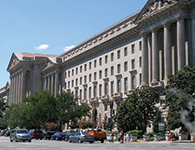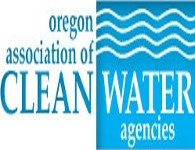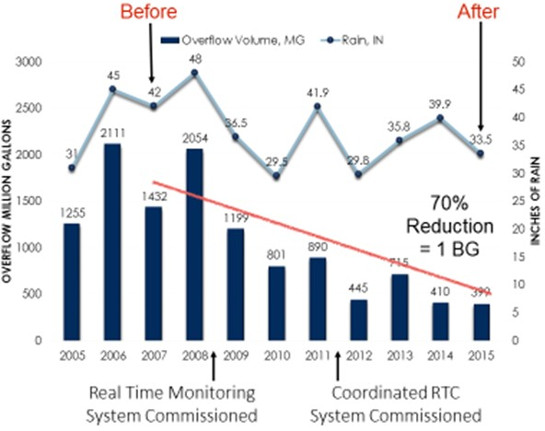 NACWA submitted
NACWA submitted  comments on July 27 on EPA’s 2016 Preliminary Effluent Guidelines Plan. In the Plan, EPA indicates it will continue its detailed study of the Centralized Waste Treatment (CWT) Category, which is currently focused on oil and gas extraction wastewater. In its comments, NACWA recommended that the Agency consider making this study broader, due to the problems that utilities have experienced with discharges from CWTs.
comments on July 27 on EPA’s 2016 Preliminary Effluent Guidelines Plan. In the Plan, EPA indicates it will continue its detailed study of the Centralized Waste Treatment (CWT) Category, which is currently focused on oil and gas extraction wastewater. In its comments, NACWA recommended that the Agency consider making this study broader, due to the problems that utilities have experienced with discharges from CWTs.
NACWA also recommended that EPA consider studying the Landfills Category. There are currently no pretreatment standards for this category, but some utilities have had problems with landfill leachate interfering with ultraviolet (UV) disinfection. Since more POTWs are moving to UV disinfection, NACWA asserts that this issue should be further studied to determine if national pretreatment standards for landfill leachate are necessary.
Additionally, NACWA’s comments suggest that EPA consider whether the Soap & Detergent Manufacturing Category is still necessary, and offered to discuss other categories that have raised concerns for Association members, including the Hospital Category and the Pharmaceutical Manufacturing Category. Member Agencies are requested to contact Cynthia Finley, NACWA’s Director of Regulatory Affairs, with comments on these or any other categories that are causing issues at their utility.
Association Provides Municipal Voice to Water Infrastructure Financing Discussion
 NACWA participated in a roundtable discussion last week on water infrastructure financing issues organized by the Bipartisan Policy Center (BPC) and held in Philadelphia in conjunction with the Democratic National Convention. The discussion focused on the current financing challenges around water infrastructure investment and potential solutions. Participants included public agencies, private corporations, consultants, finance experts, and former elected and appointed officials, such as former Housing & Urban Development Secretary Henry Cisneros, former Los Angeles Mayor Antonio Villaraigosa and former Maryland Governor Martin O’Malley.
NACWA participated in a roundtable discussion last week on water infrastructure financing issues organized by the Bipartisan Policy Center (BPC) and held in Philadelphia in conjunction with the Democratic National Convention. The discussion focused on the current financing challenges around water infrastructure investment and potential solutions. Participants included public agencies, private corporations, consultants, finance experts, and former elected and appointed officials, such as former Housing & Urban Development Secretary Henry Cisneros, former Los Angeles Mayor Antonio Villaraigosa and former Maryland Governor Martin O’Malley.
NACWA was invited to participate in the discussion to provide a municipal clean water utility perspective and played a critical role in explaining the significant funding and affordability challenges facing the nation related to clean water infrastructure. Member Agency the Philadelphia Water Department also provided key input. All participants in the discussion agreed that, especially in light of the recent tragedy in Flint, Michigan, more needs to be done to educate the American public and national policymakers about the critical role of water infrastructure. NACWA looks forward to working with the BPC and other stakeholders to advance these important issues during the coming election season and with a new presidential administration.
NACWA Brings National Update to Oregon Clean Water Agencies
 NACWA participated in the Oregon Association of Clean Water Agencies’ (ORACWA) Annual Meeting, July 27-29 in Bend, Oregon, to provide the national perspective on wastewater and stormwater trends and the latest developments on the legislative, legal and regulatory fronts. The conference program included presentations on water reuse, innovative biosolids solutions, the value of partnerships and water resource sustainability – including a compelling discussion of reinventing our relationship with water through better design.
NACWA participated in the Oregon Association of Clean Water Agencies’ (ORACWA) Annual Meeting, July 27-29 in Bend, Oregon, to provide the national perspective on wastewater and stormwater trends and the latest developments on the legislative, legal and regulatory fronts. The conference program included presentations on water reuse, innovative biosolids solutions, the value of partnerships and water resource sustainability – including a compelling discussion of reinventing our relationship with water through better design.
A session on flushable wipes, with the Association providing an update on national developments, helped to wrap up the final day of the meeting. NACWA also bid a fond farewell to Janet Gillespie, longtime Executive Director of ORACWA, who will be leaving the organization in the near future. Under Janet’s leadership ORACWA has become one of NACWA’s strongest state partners. The Association looks forward to continuing to work closely with ORACWA into the future.
Political Conventions Close, NACWA to Engage Major Party Presidential Campaigns
 Both the Republican and Democratic National Conventions have now come to a close, signaling the start of the general election campaign season. The importance of infrastructure investment was discussed at both conventions, including a specific mention by Sen. Bernie Sanders (D-VT) at the Democratic Convention when he called for national investment in water systems and wastewater treatment plants. Although the two major political parties have stark policy differences on a number of issues, the need to prioritize infrastructure has emerged as a key area where politicians from both parties can agree.
Both the Republican and Democratic National Conventions have now come to a close, signaling the start of the general election campaign season. The importance of infrastructure investment was discussed at both conventions, including a specific mention by Sen. Bernie Sanders (D-VT) at the Democratic Convention when he called for national investment in water systems and wastewater treatment plants. Although the two major political parties have stark policy differences on a number of issues, the need to prioritize infrastructure has emerged as a key area where politicians from both parties can agree.
As the general election cycle moves into full swing, NACWA will be sending letters to both the Trump and Clinton campaigns outlining the major issues that the Association hopes to see discussed on the campaign trail. NACWA will also be pursuing engagement with both candidates to communicate the major advocacy priorities of the municipal clean water sector. The Association membership will be kept up-to-date on key developments.
Water Sector Groups Advance Energy-Water Nexus Discussions
 NACWA and other water sector organizations are following up on the topics discussed during the Department of Energy’s (DOE) Energy Water Nexus RoundtableEnergy Water Nexus Roundtable series last year. The roundtable discussions featured a cross-section of issues related to the energy-water nexus, including the impacts of climate change, energy security and system integration. Notably, the series featured a presentation on water infrastructure and the potential for wastewater treatment plants as utilities of the future.
NACWA and other water sector organizations are following up on the topics discussed during the Department of Energy’s (DOE) Energy Water Nexus RoundtableEnergy Water Nexus Roundtable series last year. The roundtable discussions featured a cross-section of issues related to the energy-water nexus, including the impacts of climate change, energy security and system integration. Notably, the series featured a presentation on water infrastructure and the potential for wastewater treatment plants as utilities of the future.
To advance these discussions NACWA, Association of Metropolitan Water Agencies (AMWA), American Water Works Association (AWWA), National Association of Water Companies (NAWC), Water Environment Federation (WEF), Water Environment & Reuse Foundation (WE&RF), and Water Research Foundation (WRF), have sent a letter to Secretary Moniz requesting a meeting to present the needs of the water community related to energy. Organizers also plan to discuss opportunities for the clean water community to collaborate with DOE on future budget considerations, as well as ways to enhance utility of the future activities. NACWA will notify members when the meeting is scheduled and continue to report on any developments on federal energy activities.
to Secretary Moniz requesting a meeting to present the needs of the water community related to energy. Organizers also plan to discuss opportunities for the clean water community to collaborate with DOE on future budget considerations, as well as ways to enhance utility of the future activities. NACWA will notify members when the meeting is scheduled and continue to report on any developments on federal energy activities.
Utilities, NGOs, Community Groups Meet to Promote Urban Watersheds
 NACWA participated in the Urban Waters National Training Workshop held last week in Arlington, VA. The training, hosted by the 14 federal agency partners behind the Urban Waters Federal Partnership (UWFP)Urban Waters Federal Partnership (UWFP), aims to bring together and inform attendees, who are often partners in the UWFP projects, on the many complex components of successful urban watershed management and projects. This year’s topics included engaging elected officials, effective communication strategies, green infrastructure as a component of broader community priorities and environmental justice.
NACWA participated in the Urban Waters National Training Workshop held last week in Arlington, VA. The training, hosted by the 14 federal agency partners behind the Urban Waters Federal Partnership (UWFP)Urban Waters Federal Partnership (UWFP), aims to bring together and inform attendees, who are often partners in the UWFP projects, on the many complex components of successful urban watershed management and projects. This year’s topics included engaging elected officials, effective communication strategies, green infrastructure as a component of broader community priorities and environmental justice.
The UWFP has been praised as a cutting-edge inter-agency partnership, distinguished by its ability to combine delivery of federal programs. It brings together community stakeholders, environmental groups, federal and local governments – including clean water utilities – in 19 designated urban waters locations by funding community-led revitalization efforts. These projects promote economic, environmental and social benefits, and NACWA is proud that many of our members are partners including Littleton/Englewood Wastewater (CO), Metro Wastewater Reclamation District (CO), the City of Atlanta (GA), and the City of Grand Rapids (MI) to name just a few.
Association Members & Staff Participate in DC-Area Local Government Meeting
 NACWA Member Agencies and Association staff attended the Metropolitan Washington Council of Governments (MWCOG) Joint Meeting of the Chesapeake Bay Water Resources Policy and Climate, Energy & Environment Committees on July 27. The joint meeting was designed to share information with, and between, these two Committees working on water quality and energy issues – with a focus on how utilities and municipalities are addressing energy-water challenges.
NACWA Member Agencies and Association staff attended the Metropolitan Washington Council of Governments (MWCOG) Joint Meeting of the Chesapeake Bay Water Resources Policy and Climate, Energy & Environment Committees on July 27. The joint meeting was designed to share information with, and between, these two Committees working on water quality and energy issues – with a focus on how utilities and municipalities are addressing energy-water challenges.
Several NACWA members from the metropolitan Washington area including the Washington Suburban Sanitary Commission (MD), Alexandria Renew Enterprises (VA), and DC Water (DC) participated on a panel to discuss their innovative work. The Committees also voted to endorse a new draft MWCOG policy principle which states that policies and programs to restore and protect Chesapeake Bay should be structured so that local governments, wastewater utilities, and other entities have flexibility and opportunities to innovate as they meet environmental objectives.
Water Quality Trading Alliance Releases New Resource
 The National Water Quality Trading Alliance (NWQTA), of which NACWA is a member, recently released a new document highlighting the benefits of water quality trading and seeking to address some of the concerns that have been raised with the practice. The report notes that water pollution problems across the nation are complex, involving myriad pollutants, sources and causes. These include not just piped discharges from wastewater treatment plants but diffuse runoff from urban areas, agricultural fields and even air deposition. Although water pollution may seem “local” in terms of causes and effects, the far-field effects of multiple contributing sources have led to large-scale impairments in some of our Nation’s most iconic watersheds, such as the Chesapeake Bay and the Mississippi River.
The National Water Quality Trading Alliance (NWQTA), of which NACWA is a member, recently released a new document highlighting the benefits of water quality trading and seeking to address some of the concerns that have been raised with the practice. The report notes that water pollution problems across the nation are complex, involving myriad pollutants, sources and causes. These include not just piped discharges from wastewater treatment plants but diffuse runoff from urban areas, agricultural fields and even air deposition. Although water pollution may seem “local” in terms of causes and effects, the far-field effects of multiple contributing sources have led to large-scale impairments in some of our Nation’s most iconic watersheds, such as the Chesapeake Bay and the Mississippi River.
New and better tools are needed to accelerate the pace and scale of water quality restoration, to bring other sectors into the effort and to produce more affordable and efficient environmental return on investment. Water quality trading is such a tool, allowing for more efficient and affordable improvement of water quality and bringing in private capital to supplement the good start made by federal, state, and local governments and the regulated community.
South Bend Pioneers Real Time Monitoring
 Fully installed in 2011, the City of South Bend, Indiana’s CSOnet is the first system to monitor and control combined sewer overflows in real time through the use of embedded computer sensors in a decentralized radio network. CSOnet was developed from a research partnership between the private sector and academia to control wet weather flow.
Fully installed in 2011, the City of South Bend, Indiana’s CSOnet is the first system to monitor and control combined sewer overflows in real time through the use of embedded computer sensors in a decentralized radio network. CSOnet was developed from a research partnership between the private sector and academia to control wet weather flow.
The network of over 140 sensors transmit data through a series of nodes every five minutes, providing technicians with color-coded warnings of rising waters. When needed, the sensors can work together to send “open” or “shut” messages to a series of nine smart valves and ensure that water flows optimally toward the plant during and after peak demand. The City has spent close to $6 million installing this decentralized, automated approach to flow management. “The CSOnet program has helped South Bend eliminate dry weather overflows and reduce their combined sewer overflow volume by 70%,” Eric Horvath, South Bend Department of Public Works’ Executive Director said. “This is 1 billion gallons less of combined sewage dumping into the river every year.”

The system will save the city over $100 million on anticipated sewer expansion costs and lower the risk of accruing expensive fines from the US EPA. Less CSOs is not only compliance but improves water quality, improves human health, and allows for aquatic recreation. The City of South Bend was recognized with a NACWA National Environmental Achievement Award this past February in the Operations & Environmental Performance category for its CSOnet program.